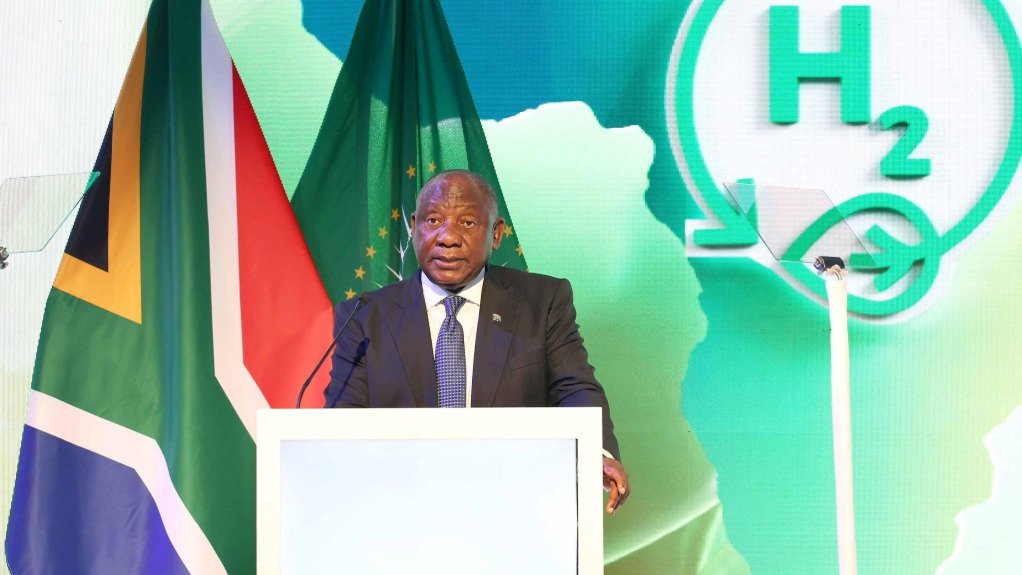President Cyril Ramaphosa has again underlined the industrialisation potential of green hydrogen, and has stressed that South Africa will use its G20 Presidency as well as its participation in the upcoming G7 meeting in Canada to call for a prioritisation of just energy transitions as engines of economic growth and social development.
In an address to the Africa Green Hydrogen Summit in Cape Town, Ramaphosa described green hydrogen as an anchor for industrial transformation and infrastructure investment, as well as a bridge to a new export industry for African countries.
However, he said its potential could be realised only if prevailing impediments to the growth of the industry were addressed.
Besides the role of African governments in creating supportive regulations and clear standards, the President expressed concern about skewed global investment patterns and the high cost of capital for African projects.
“A number of green hydrogen projects on our continent are not being initiated or reaching financial close, due to cost of capital and perceptions of risk.”
H2GLOBAL’S AFRICA LOT COMMENDED
Ramaphosa, thus, commended the German government’s decision to include a specific allocation for Africa in its second H2Global auction, which was launched earlier this year.
The African lot, he said, would guarantee offtake for successful projects on the continent.
The auction comprises five lots and includes a budget of at least €484-million apiece for four regional projects in Africa, Asia, North America, and South America and/or Oceania.
Suppliers bidding in the regional lots are allowed to offer renewable hydrogen, ammonia, or methanol, all of which must be delivered to a designated hub in Germany from 2028.
Ramaphosa also stressed the need for a shift from ideas to commitments, echoing Western Cape Premier Alan Winde’s opening remarks stating the need to move from “PowerPoints to gigawatts”.
Ramaphosa’s speech was followed by a series of signing agreements, including an inaugural $20-million investment by the SA-H2 Fund to support the development of the one-million-ton-a-year Hive Hydrogen Coega Green Ammonia Project, in the Eastern Cape.
Electricity and Energy Minister Dr Kgosientsho Ramokgopa also emphasised the potential of green hydrogen to “drive industrial growth and localisation”, using the occasion to formally launch the South African Renewable Energy Masterplan, following its recent approval by Cabinet.
“The masterplan aims to leverage South Africa’s growing renewable-energy demand, including for green hydrogen, to stimulate upstream and downstream industrial development across solar PV, wind, battery storage, electrolysers, and fuel-cell technologies.
“This includes building domestic capability in component manufacturing, assembly, and engineering services,” Ramokgopa said.
The Africa Green Hydrogen Report was also released at the summit, synthesising more than 35 studies from South Africa alone.
Produced with the support of the GIZ, the report offers detailed assessments on port readiness, cost competitiveness, domestic and export demand modelling, renewable-energy and transmission capacity, critical minerals linkages, certification frameworks, job creation potential, and socioeconomic impacts.
“[The report’s] message is unequivocal: Africa is not short of knowledge. Africa is ready to move from pilot to pipeline, from strategy to scale,” Ramokgopa averred.
However, he warned that the window for Africa to participate in shaping the rules of the green-hydrogen market was narrowing.
“Other regions are moving fast, with public subsidies, regulatory incentives, and long-term offtake strategies.
“If we delay, we risk importing technologies, importing skills, and once again exporting unprocessed potential.”
EMAIL THIS ARTICLE SAVE THIS ARTICLE ARTICLE ENQUIRY FEEDBACK
To subscribe email subscriptions@creamermedia.co.za or click here
To advertise email advertising@creamermedia.co.za or click here











